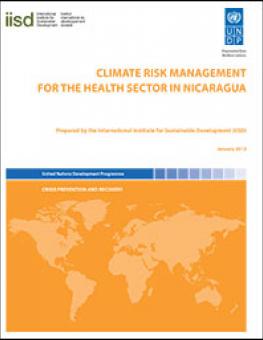
Climate Risk Management for the Health Sector in Nicaragua
Nicaragua faces enormous development challenges as the poorest country in Central America.
While health conditions and services are improving, the sector still suffers from significant shortages. Levels of undernourishment are high and access to clean water and sanitation lags behind regional and global averages. The prevalence of diarrhœa, dengue and leptospirosis is closely related to seasonal rainfall patterns and extreme events, which increase the emergence of standing water sources that facilitate disease transmission. Climate change will likely add stress to this situation by increasing conditions of water scarcity, and may affect health indirectly through impacts on agriculture and biodiversity. Managing climate risks to human health in Nicaragua will require, first and foremost, universal and secure access to clean water and sanitation. This can be complemented by additional strategies such as water conservation, expansion of flood controls, reforestation of water catchment areas and riverbeds, expanded coverage of health services, awareness-raising campaigns, increased support for community disaster committees, the establishment of climate and health monitoring and early-warning systems, and risk management actions in agriculture and other sectors.
Additional downloads
You might also be interested in
Climate Risks, Vulnerability and Governance in Kenya: A review
Climate-related risks adversely affect the lives and livelihoods of the people of Kenya and threaten the country's near- and long-term development prospects. The paper provides sector-specific recommendations to address knowledge gaps and general recommendations to strengthen response capacity.